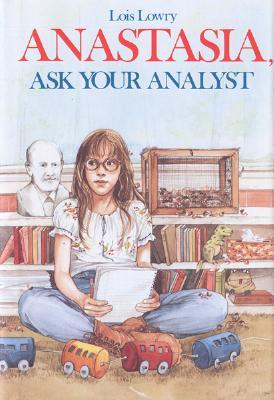Anastasia is now thirteen years old, and between her annoying family and the unpredictability of the gerbils she brought home for her science project, she really feels like she could benefit from some time in therapy. Her parents recognize her dramatics as part and parcel of puberty, and they refuse to pay for any counseling, so Anastasia takes matters into her own hands. She buys a bust of Sigmund Freud in whom she confides all of her problems big and small, and whose assistance seems helpful despite his silence.
This book, like the others in the series so far, is essentially a literary family sit-com. It focuses on Anastasia’s day-to-day interactions with her academic parents, precocious little brother and various classmates, putting a humorous spin on everything from homework to early teen angst. Though Anastasia ages from book to book, she always remains uniquely herself, and I am impressed by how well Lowry must know her character in order to write so effectively about the changes she undergoes from year to year. I particularly love that Anastasia is so articulate and self-aware. I laughed out loud when she confessed to her mother that she hated her and then asked for a cure. It’s so refreshing to see a fictional character whose relationship with her mother is that honest, and whose conversations with her parents are so frank.
The highlight of this book is Anastasia’s struggle to contain her gerbils, which begin as a pair and quickly grow to a family of eleven. Though class pets getting loose in family homes is a common occurrence in many children’s books, few authors handle the situation with such clever writing or with such amusing collaboration between teen and toddler siblings. Some of the best parts of this book involve Sam and Anastasia secretly working together to keep their mother from learning there are rodents loose in her home. Also interesting are Anastasia’s notes on her science project, which follow a similar format to her likes and dislikes list back in the first book, Anastasia Krupnik.
Though this book has one of the worst covers of the series so far, it is one of the more memorable stories. Girls who enter puberty in the middle grade years will especially enjoy Anastasia’s candid descriptions of the experience, and they will laugh along as she confides in “Sigmund,” chases down gerbils and struggles to pin down what it means to be normal.


No comments:
Post a Comment